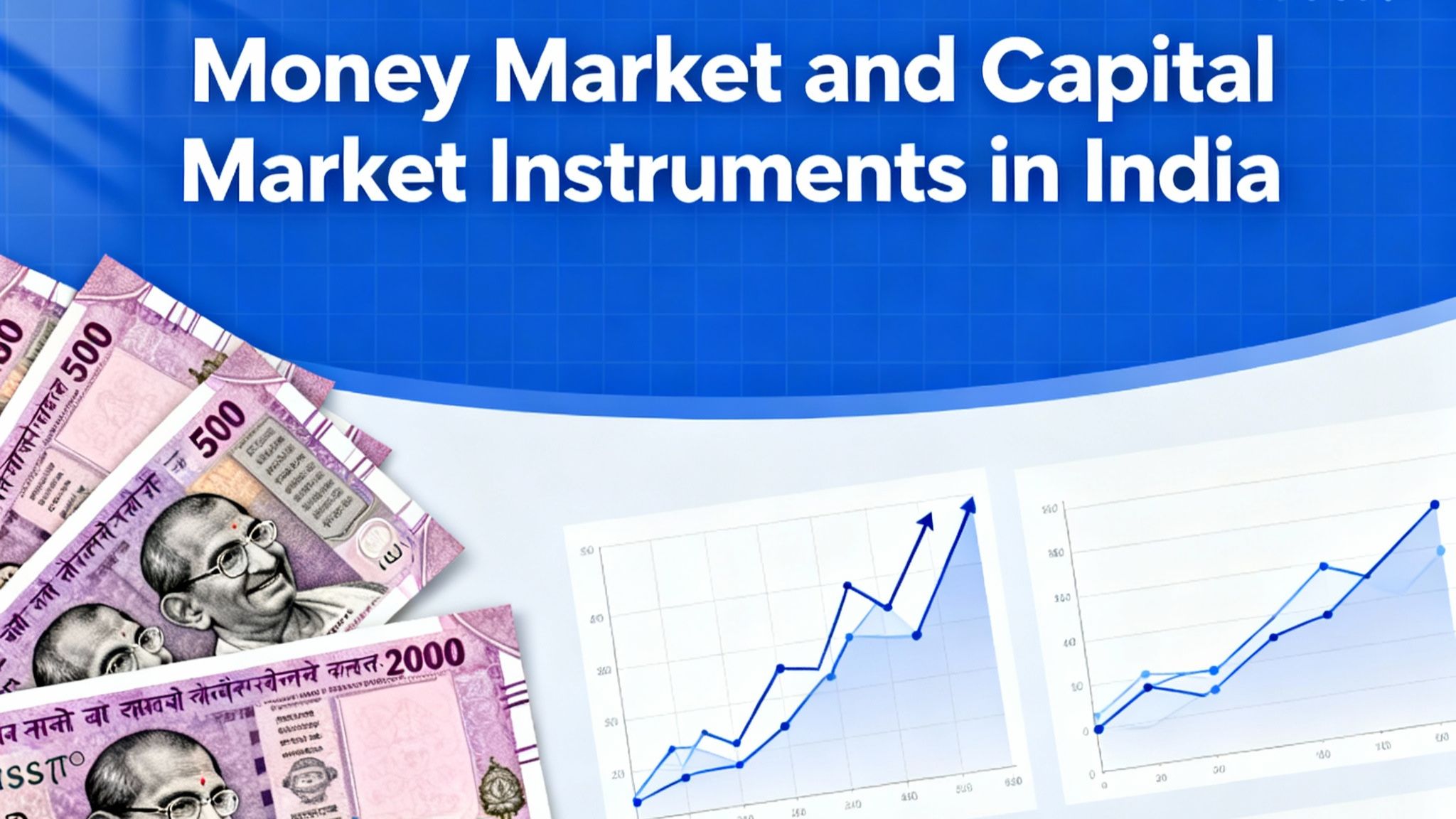Money Market Instruments: The Realm of Short-Term Liquidity
The money market provides a platform for short-term lending and borrowing, typically for periods ranging from overnight to one year. It’s crucial for managing immediate liquidity needs and plays a vital role in the transmission of monetary policy.
1. Treasury Bills (T-Bills): The Government’s Short-Term IOU
- Issuer: Reserve Bank of India (RBI) on behalf of the Government of India. This sovereign backing makes them virtually risk-free in terms of credit risk.
- Maturity: Typically offered with maturities of 91 days, 182 days, and 364 days. Occasionally, other tenors might be introduced.
- Issuance Mechanism: Issued at a discount to their face value. The return to the investor is the difference between the purchase price and the face value1 received at maturity. There are no periodic interest payments.
- Participants: Banks, financial institutions, primary dealers, corporates, and even individuals can invest in T-Bills.
- Significance: They are a key instrument for the government to manage its short-term cash flows. They also serve as a benchmark for pricing other short-term debt instruments and are an important tool for the RBI in managing liquidity in the financial system. The yields on T-Bills often reflect the prevailing short-term interest rate environment.
2. Commercial Papers (CPs): Corporate Short-Term Funding
- Issuer: Highly rated corporations, primary dealers, and all-India financial institutions (AIFIs). The issuer’s creditworthiness is paramount as these are unsecured instruments.
- Maturity: Range from a minimum of 7 days to a maximum of one year from the date of issue.
- Issuance Mechanism: Issued at a discount to face value, similar to T-Bills.
- Participants: Banks, mutual funds, insurance companies, corporates, and high-net-worth individuals (HNIs).
- Significance: CPs provide a flexible and cost-effective way for well-rated companies to raise short-term funds to meet working capital needs, such as financing inventory and receivables. The yields on CPs reflect the credit risk of the issuing company and the prevailing short-term interest rates. The development of the CP market indicates the growing sophistication of corporate finance in India.
3. Certificates of Deposit (CDs): Banks’ Term Deposits
- Issuer: Scheduled commercial banks (excluding Regional Rural Banks and Local Area Banks) and select all-India financial institutions2 (AIFIs) authorized by the RBI.
- Maturity: For banks, the maturity ranges from a minimum of 7 days to a maximum of one year. For AIFIs, the maturity ranges from a minimum of 1 year to a maximum of 3 years.
- Issuance Mechanism: Can be issued at a discount or with a fixed interest rate payable at maturity or periodically. They are typically negotiable, meaning they can be traded in the secondary market before maturity, offering liquidity to investors.
- Participants: Individuals, corporates, trusts, and other institutions seeking short-term investment avenues.
- Significance: CDs are a crucial source of short-term funding for banks and financial institutions, allowing them to manage their asset-liability mismatches. They offer investors a relatively safe investment option with potentially higher returns than savings accounts for a fixed period.
4. Repurchase Agreements (Repo): Short-Term Lending Secured by Securities
- Mechanism: Involves two legs: (1) the sale of securities with an agreement to repurchase them at a future date and a specified price, and (2) the subsequent repurchase of the securities. The difference between the sale price and the repurchase price represents the interest paid by the borrower.
- Underlying Security: Primarily government securities (G-secs), but can also include other approved securities. The security acts as collateral, making repos relatively low-risk.
- Participants: Banks, primary dealers, financial institutions, and other entities with surplus funds or needing short-term funds. The RBI uses repo and reverse repo (where the RBI borrows from banks) as key tools for managing liquidity in the banking system and influencing short-term interest rates.
- Tenor: Can range from overnight to longer periods, but the overnight repo is particularly significant for immediate liquidity adjustments.
- Significance: Repos provide a flexible and efficient way for financial institutions to manage their short-term liquidity needs. They also play a crucial role in the functioning of the interbank lending market and the transmission of monetary policy signals.
5. Commercial Bills: Financing Trade Transactions
- Mechanism: A seller of goods draws a bill of exchange (a written order to pay a certain sum on a specific date) on the buyer. Once the buyer accepts the bill, it becomes a commercial bill.
- Discounting: The seller can either hold the bill until maturity or discount it with a bank or a financial institution to receive funds immediately (less the discount charges).
- Maturity: Typically ranges from 30 to 90 days, aligning with typical trade credit periods.
- Participants: Businesses involved in trade transactions, banks, and financial institutions that discount these bills.
- Significance: Commercial bills facilitate trade finance by providing a negotiable instrument that allows sellers to receive payment before the actual credit period ends. The commercial bill market supports the smooth flow of goods and services in the economy.
Capital Market Instruments: Fueling Long-Term Growth
The capital market deals with long-term debt and equity instruments, typically with maturities of more than one year. It provides the necessary capital for businesses to expand, invest in infrastructure, and drive economic growth.
1. Equity Shares: Ownership and Participation in Growth
- Nature: Represent a fractional ownership in a company. Shareholders are entitled to a portion of the company’s profits (dividends) and have voting rights in key company decisions.
- Types:
- Common Equity: The most prevalent type, carrying standard voting rights and dividend entitlements.
- Differential Voting Rights (DVR) Shares: Some companies issue shares with different voting rights (e.g., lower or no voting rights) but often with higher dividend payouts.
- Trading: Bought and sold on stock exchanges (e.g., National Stock Exchange of India (NSE) and Bombay Stock Exchange (BSE)). Price fluctuations are driven by company performance, industry trends, and overall market sentiment.
- Returns: Investors can earn returns through dividends and capital appreciation (increase in share price).
- Risk: Considered riskier than debt instruments as dividend payments are not guaranteed, and share prices can be volatile.
- Significance: Equity financing is crucial for companies to raise long-term capital without incurring debt. It allows investors to participate in the growth and profitability of businesses.
2. Preference Shares: Hybrid Instruments with Preferential Rights
- Nature: Possess characteristics of both equity and debt. Preference shareholders have a preferential right over common shareholders in the payment of dividends (at a fixed rate) and in the repayment of capital in case of liquidation.
- Voting Rights: Typically do not carry voting rights, although they may get voting rights under specific circumstances (e.g., non-payment of dividends for a certain period).
- Types:
- Cumulative Preference Shares: If dividends are not paid in a particular year, they accumulate and are paid in subsequent years before any dividend is paid to common shareholders.
- Non-Cumulative Preference Shares: Unpaid dividends are not carried forward.
- Convertible Preference Shares: Can be converted into3 equity shares after a specified period.
- Redeemable Preference Shares: Have a fixed maturity date when the principal is repaid.
- Returns: Primarily through fixed dividends. Capital appreciation potential is usually lower than that of common equity.
- Risk: Generally considered less risky than common equity but riskier than debt.
- Significance: Preference shares offer companies a way to raise capital without diluting the voting rights of common shareholders. They provide investors with a relatively stable income stream.
3. Debentures: Long-Term Debt Instruments
- Nature: Represent a long-term debt instrument issued by companies to raise funds. Debenture holders are creditors of the company and receive a fixed rate of interest (coupon) over a specified period. The principal amount is repaid at maturity.
- Security: Can be secured (backed by specific assets of the company) or unsecured (also known as naked debentures, relying on the company’s creditworthiness).
- Convertibility: Some debentures are convertible into equity shares after a certain period.
- Trading: Traded on stock exchanges, and their prices can fluctuate based on interest rate movements and the company’s creditworthiness.
- Returns: Primarily through fixed interest payments and the return of principal at maturity. Capital appreciation is possible if interest rates decline.
- Risk: Depends on the creditworthiness of the issuing company and whether they are secured or unsecured.
- Significance: Debentures are a significant source of long-term debt financing for companies, providing a predictable cost of capital.
4. Bonds: Fixed-Income Securities from Various Issuers
- Issuer: Can be the government (government bonds or G-secs), state governments (state development loans or SDLs), municipalities (municipal bonds), and corporations (corporate bonds).
- Nature: Similar to debentures, bonds are debt instruments with a fixed interest rate (coupon) and a maturity date when the principal is repaid.
- Risk and Return: Vary significantly depending on the issuer. Government bonds are generally considered low-risk (sovereign risk), while corporate bonds carry credit risk related to the issuing company’s financial health.
- Trading: Actively traded in the secondary market, and their prices are influenced by interest rate movements, credit ratings, and market sentiment.
- Types: A wide variety of bonds exist, including fixed-rate bonds, floating-rate bonds, zero-coupon bonds, inflation-indexed bonds, and green bonds.
- Significance: Bonds provide a crucial avenue for governments and corporations to raise long-term funds for infrastructure projects, public spending, and business expansion. They also offer investors a range of fixed-income investment options with varying risk profiles.
5. Mutual Funds: Diversified Investments Managed Professionally
- Nature: Pool money from multiple investors to invest in a diversified portfolio of securities (equity, debt, or a combination). Investors hold units in the fund, and the value of these units (Net Asset Value or NAV) fluctuates based on the performance of the underlying investments.
- Types: A wide array of mutual funds cater to different investment objectives and risk appetites, including:
- Equity Funds: Primarily invest in stocks.
- Debt Funds: Invest in fixed-income securities like bonds and debentures.
- Hybrid Funds: Invest in a mix of equity and debt.
- Money Market Funds: Invest in short-term money market instruments.
- Index Funds and ETFs: Track a specific market index.
- Sectoral and Thematic Funds: Focus on specific industries or investment themes.
- Management: Managed by professional fund managers who make investment decisions on behalf of the investors.
- Regulation: Highly regulated by the Securities and Exchange Board of India (SEBI) to protect investors.
- Significance: Mutual funds provide small investors with access to diversified portfolios and professional management, making it easier to participate in the capital markets. They also offer liquidity as investors can typically buy and sell units on any business day.
6. Exchange-Traded Funds (ETFs): Combining Features of Stocks and Mutual Funds
- Nature: Similar to mutual funds in that they invest in a basket of securities, but unlike traditional mutual funds, ETFs trade on stock exchanges like individual stocks.
- Mechanism: The price of an ETF unit fluctuates throughout the day based on supply and demand, similar to a stock. However, their underlying value is linked to the net asset value of the securities they hold.
- Types: Track various market indices (e.g., Nifty 50 ETF, Sensex ETF), specific sectors (e.g., banking ETF, IT ETF), or even asset classes like gold.
- Liquidity and Transparency: Offer high liquidity as they can be bought and sold easily on exchanges. Their holdings are typically disclosed daily, providing transparency.
- Expense Ratio: Generally have lower expense ratios compared to actively managed mutual funds.
- Significance: ETFs provide investors with a cost-effective and transparent way to gain exposure to specific market segments or asset classes. They offer the diversification benefits of a mutual fund with the trading flexibility of a stock.
Understanding the detailed characteristics of each of these money market and capital market instruments is crucial for investors and businesses alike to make informed financial decisions in the Indian context. The interplay between these markets and their instruments drives the flow of funds necessary for economic development.














